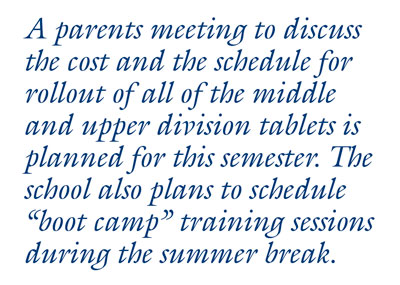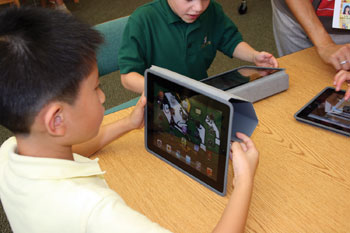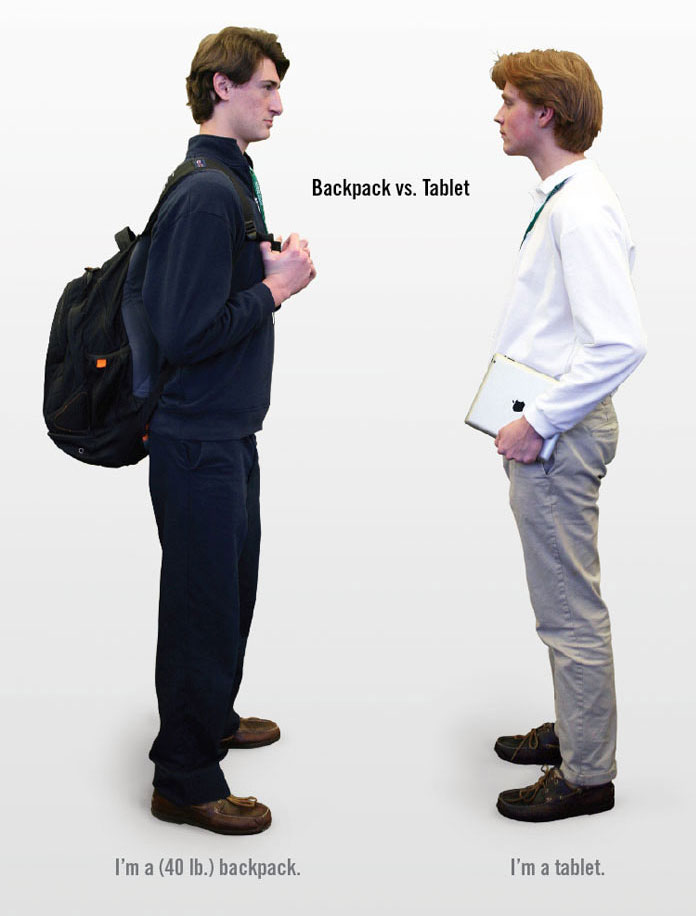Notre Dame is in the midst of dramatically upgrading classroom hardware and software to ensure students have access to some of the best learning technology in the world. In an article published in the January-February Blarney Stone, the NDPMA community's main newsletter, school administrators discuss how technology used at Notre Dame is continuing to undergo some big changes.
Elementary and high schools from Burlington, Massachusetts, to Coachella Valley in California are moving headlong into digital technology in the classroom. While most are public schools and many are in wealthier school districts, private schools like Notre Dame Preparatory School and Marist Academy also are jumping into plans that eventually will lead to computer tablets for all students, or “one-to-one” (1:1).
Apple Computer said recently that more than 600 school districts in the U.S. have bought its iPads for their students. In a recent article in Macworld magazine about digital education, Burlington (Mass.) High School principal Patrick Larkin justified the cost by how it will dramatically transform the way students are educated.
 “One of the big things was that we decided we’d stop doing any textbook adoptions,” Larkin said. “If we were going to buy a new ninth-grade English textbook—that’s a lot of money to spend on a textbook. Teachers weren’t using every aspect of the [paper] textbook anyway. Instead of spending that money on textbooks, we could spend it to help teachers curate and sometimes even create their own content.”
“One of the big things was that we decided we’d stop doing any textbook adoptions,” Larkin said. “If we were going to buy a new ninth-grade English textbook—that’s a lot of money to spend on a textbook. Teachers weren’t using every aspect of the [paper] textbook anyway. Instead of spending that money on textbooks, we could spend it to help teachers curate and sometimes even create their own content.”
Notre Dame’s own aggressive push into digital technology took its own big step forward last month as administration officials signed the dotted line on an agreement to access tablets for a pilot program scheduled to begin early this semester in the school’s middle and upper divisions.
Joanne Widmaier, Notre Dame’s registrar and academic technology coordinator, said everything is on track for full one-to-one digital access by August. “In December, we set in motion the access of Microsoft Surface Pro 2 tablets for students in grades six through 12,” she said.
“Technology enables students to learn in ways not previously possible,” Widmaier said. “Effective integration of technology is achieved when students are able to select technology tools to help them obtain information in a timely manner, analyze and synthesize the information, and present it professionally. The technology should [and will] become an integral part of how the classroom functions. It will be as accessible as all other classroom tools.”
All students in Notre Dame’s second through fifth grades already are using tablets—Apple iPads—which are fully integrated into the daily curriculum, Widmaier noted, and she says the first graders in particular are well engaged, especially with the mathematics apps. However, after an exhaustive evaluation of available tablets, including the iPad, school administrators decided the other two divisions will get a different device.
“We chose the Surface tablets for the pilot program in the middle and upper divisions,” Widmaier said, “and it includes Windows 8.1, plus the full Microsoft Office Suite 2013 as well as other software. The iPad is great, but the Surface tablet just worked out better for grades six through 12.”
Apple iPads were deployed at ND Marist Academy’s lower division in September.
A parents meeting to discuss the cost and the schedule for rollout of all of the middle and upper division tablets is planned for this semester. The school also plans to schedule “boot camp” training sessions during the next summer break.
Melissa York, a teacher in Notre Dame’s middle division who has master’s degree in Educational Technology from Michigan State University and a B.S degree in elementary education from Oakland University, is NDPMA’s new technology integration specialist and will assist all teachers and students throughout the transition to digital.
So given this rush to technology, are traditional paper textbooks and notebooks and the heavy backpacks to carry them all heading permanently to the recycle bin? Not totally, at least for a while, according to Widmaier. “In general, textbook publishers have been slow in responding to the digital age,” she said. “And we have some existing contracts with publishers for hard-cover textbooks, so I see ‘e-books’ transitioning within our curriculum over a several-year period rather than all at once.”
In the future, as Notre Dame moves more fully into one-to-one, Widmaier says the big backpacks eventually will be a memory. “If anything, students might be carrying a much smaller backpack, much like a messenger bag, with the largest item inside likely a hybrid tablet/PC weighing only about two to three pounds.”
Follow Notre Dame at @NDPMA.
About Notre Dame Preparatory School and Marist Academy
Notre Dame Preparatory School and Marist Academy is a private, Catholic, independent, coeducational day school located in Oakland County. The school's upper division enrolls students in grades nine through twelve and has been named one of the nation's best 50 Catholic high schools (Acton Institute) four times since 2005. Notre Dame's middle and lower divisions enroll students in jr. kindergarten through grade eight. All three divisions are International Baccalaureate "World Schools." NDPMA is conducted by the Marist Fathers and Brothers and is accredited by the Independent Schools Association of the Central States and the North Central Association Commission on Accreditation and School Improvement. For more on Notre Dame Preparatory School and Marist Academy, visit the school's home page at www.ndpma.org.

